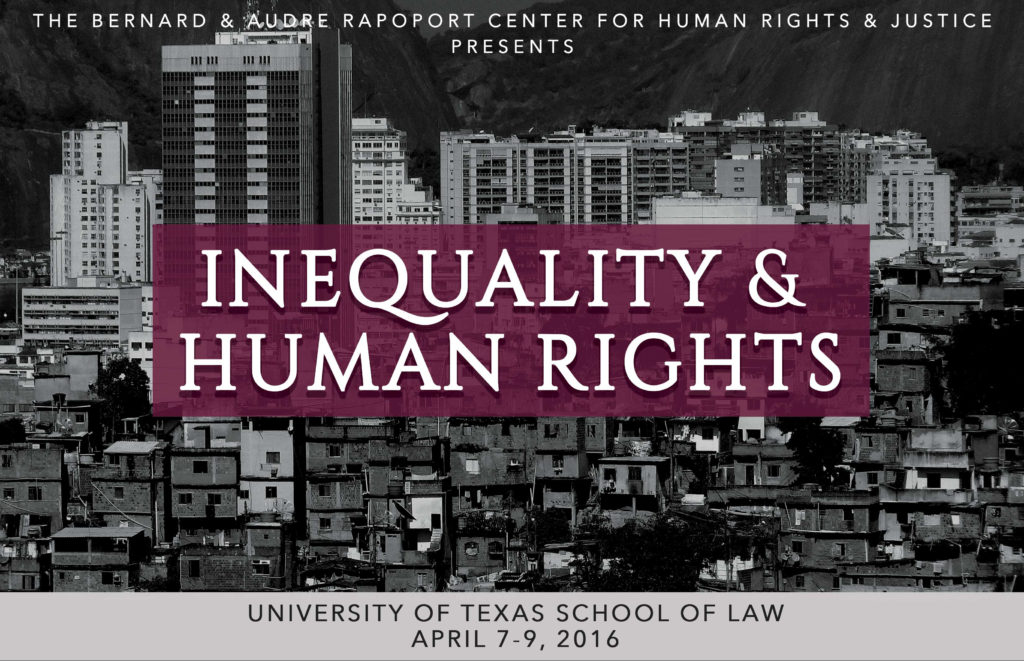
Inequality & Human Rights
Ten years after Thomas Friedman told us that we live in a “flat” world, it seems more accurate to say that economic inequality – between and within nations, in the Global South and the Global North – is the hallmark of our age. Moreover, inequality is a product of decisions made in many different spheres, from economics and the environment to labor and health. So how do we begin to tackle such an endemic problem and the underlying structures that perpetuate it? Might human rights offer at least part of the answer?
These were the principal questions posed at the Rapoport Center’s twelfth annual conference, “Inequality & Human Rights.” From April 7-9, 2016, nearly 50 human rights practitioners and scholars from 11 disciplines and 12 countries met at the University of Texas to discuss their work through the dual lenses of inequality and human rights. Participants were partly selected from over 130 responses to our call for papers. More than 250 people registered to attend the conference.
While most of the speakers agreed that human rights approaches have rarely directly addressed issues of economic inequality, one of the themes that emerged in the opening night’s plenary panels is that human rights responses to economic inequality might be less remote than originally anticipated.
In a panel bringing together economists and human rights lawyers, Rodrigo Uprimny (Universidad Nacional de Colombia and member of the UN Committee on Economic, Social, and Cultural Rights) reminded us of the fusion of redistributive equality and social rights in the 1917 Mexican constitution and in post-war European welfare states. He called for building new bridges between social rights and economic equality, and even suggested legal arguments grounded in social rights that might require states to reduce inequality.
In a similar vein, panelists exploring inequalities among countries turned to the history of de-colonization to help rethink the future. Noting in particular the 1970’s Third World-sponsored New International Economic Order, a consensus emerged around the need to envision a “new-New International Economic Order.”
In reflecting on such an order, Balakrishnan Rajagopal (Massachusetts Institute of Technology) insisted that we are both closer to and further from realizing it than we think: “All the rights that we need for bringing [it] about already exist, in fact. What we need are new practices, and maybe new solidarities.”
Panels on the second day of the conference – on taxation, debt, austerity, trade, finance, health, education, natural resources, transitional justice, and migration and immigration – offered a contextualized examination of key sites of struggles over the distribution of income, benefits, access, decision-making power, and risk-exposure.
UT student Jordan Auzenne commented that, “When [the speakers] gave real-world examples of human rights and economic inequality intersecting, like the apartheid government, it was really interesting because we usually study those instances apart from economics.”
One particularly rich discussion concerned the role of taxation in perpetuating or responding to economic inequality. According to Magdalena Sepúlveda (UN Research Institute on Social Development), taxation “is a key tool not only for tackling inequality, but for generating the resources necessary for the realization of human rights.” Judge Dennis Davis of South Africa (High Court, Cape Town), who chairs the Davis Tax Committee, added that we need to attend to spending as well. As an example, the right to education, he said, “is not just vindicated by expenditure. It’s vindicated by watching what happens to that expenditure.”
At the closing session, Daniel Brinks (Government; Rapoport Center) contended that the conference
had made great strides in exploring the “&” in the conference title that connected “inequality” to “human rights.” The presentations, he suggested, gave us a deeper understanding of the multiple and complex connections between the two.
For the Rapoport Center, the conference marked the end of an initial conceptual exploration of the relationship between economic inequality and human rights, and the beginning of deeper inquiries in more concrete areas. “We cannot think about human rights in the twenty-first century,” said Karen Engle (Law; Rapoport Center), “without thinking about inequality.” As Brinks noted, “the conference opened more questions than it answered, challenging us to nd some of the answers over the next few years.”
For more information, visit https://law.utexas.edu/inequality-conference/

